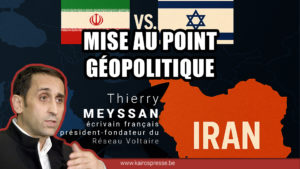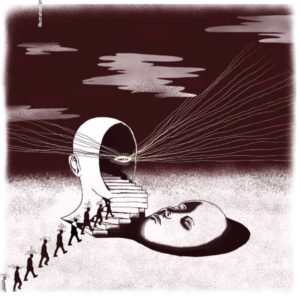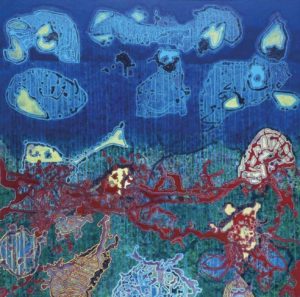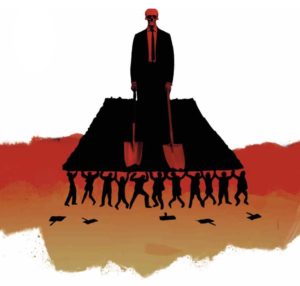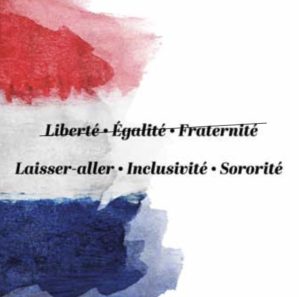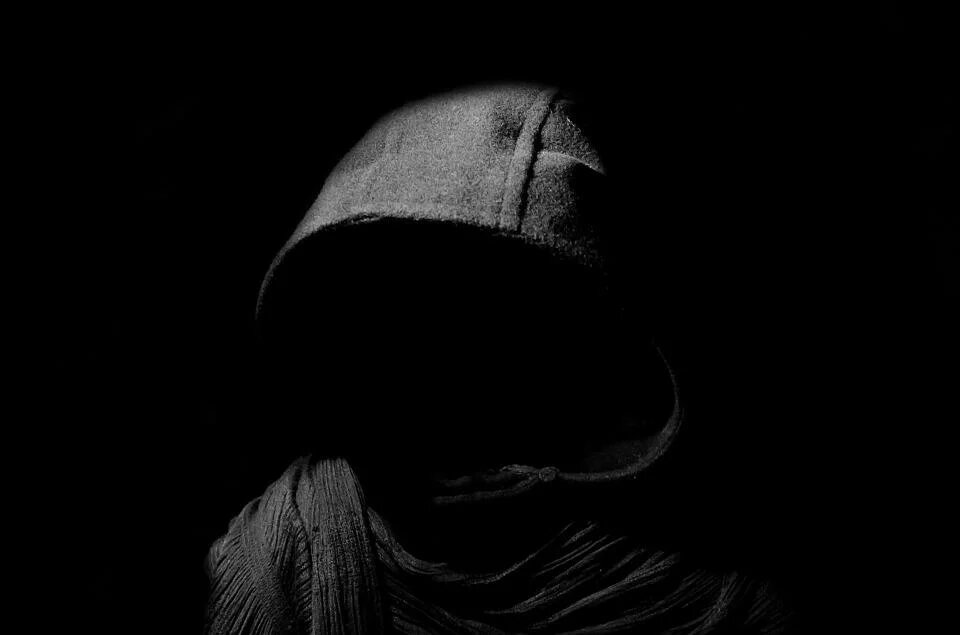
Les âmes errantes s’alignent dans le marasme ambiant. Vivantes ou mortes, la plupart ont abdiqué. Il faudrait que parmi elles se lève le fantôme de Stanislav Petrov. Qu’il nous rappelle des éléments-clés, dissouts par les maîtres de guerre ou dans la gluante bien-pensance et l’individualisme crasse : le bon sens, la réflexion et l’humilité. Avant qu’il ne soit trop tard.
Le théâtre du monde. Ses peuples, qu’ils en soient victimes ou spectateurs n’ont que rarement accès au script original. Ils ne connaissent que trop peu les auteurs des didascalies et se contentent d’une trame rudimentaire et grossière avec ses personnages désignés. Leurs pensées et leurs actions sont conditionnées par le récit proposé / imposé. Dès lors, il est facile de leur faire croire au pire et même de les y conduire. C’est encore plus frappant quand il n’y a pas de réel danger, quand le jeu est frelaté ou que la menace est accidentelle. Qu’elle soit guerrière, sanitaire, climatique, systémique…
Mais parfois, au gré des circonstances, parce que la nature humaine est capable de tout, même du meilleur, certain(e)s ne s’en laissent pas compter. Ils se rappellent à ce qu’ils sont, ils se rappellent à eux-mêmes. Faisant appel à cette force endormie, tapie sous des couches de virtuel, d’aseptisation civilisationnelle et d’épais formatage : l’instinct. Mentalisé, il devient ensuite bon sens, réflexion.
Stanislas Petrov était de cette trempe-là. Officier dans les Voyska PVO (Force de défense anti-aérienne de l’Union Soviétique) il est devenu un héros ordinaire ou un humain extraordinaire lors de « l’incident du 26 septembre 1983 ». Un incident et un héros longtemps inconnus. Il faudra attendre que la Guerre froide soit terminée, que le Mur de Berlin soit tombé et que quelques années soient passées pour que cet épisode soit officiellement déclassifié. C’était en 1998 et ce devrait être une source d’inspiration, notamment dans les temps troublés que nous vivons.
Qui sait ou se souvient que la nuit du 25 au 26 septembre 1983, sans que personne ou presque ne se rende compte de rien, le monde a failli s’engager dans une guerre sans retour et peut-être disparaître ? Dans le feu nucléaire, ce vieux spectre très présent à ce moment-là et actuellement de retour, en tête de gondole des peurs collectives.
Pour situer le climat et la tension de cette période, il faut rappeler que le 1er septembre 1983, un Boeing 747 de la Korean Airlines transportant 269 passagers dont un sénateur américain dévie de sa trajectoire et entre dans l’espace aérien de l’URSS. Il est abattu par un avion de chasse Soviétique. S’en suit une guerre de propagande américaine et russe sur cette affaire. Entre les deux blocs, l’hostilité s’intensifie, tout est en place pour le plus dangereux des scénarios.
Troublante similitude, ces jours-ci, ce programme néfaste pourrait se rejouer. On apprend que la Serbie, l’un des derniers Etats européens (avec la Hongrie) à ne pas complètement entrer dans le jeu de la « condamnation de la Russie » continue d’assurer ses liaisons aériennes avec celle-ci. Au-delà du fait que, depuis, la compagnie Air Serbia est victime d’incessantes alertes à la bombe pour perturber ses vols, un cran supérieur vient d’être franchi. Un avion de chasse de l’Otan s’est « collé » à un avion civil serbe pour pénétrer l’espace aérien russe. Pour l’heure, il n’y a pas d’explication officielle à cette conduite. On peut imaginer qu’il s’agissait de tester la défense aérienne russe. On peut aussi concevoir le plus mauvais : faire abattre un avion de ligne rempli de civils. De quoi couper le géant de l’Est de ses derniers alliés européens mais également de compléter un récit comme celui de Boutcha et flirter avec le pire. A quand l’attaque chimique, voire nucléaire qui sera forcément attribuée à la Russie ?
On constate que la perfidie qui est à la manœuvre penche plus du côté de l’inconscience de l’apprenti-sorcier que de la finesse du stratège militaire. Bien entendu, il est acquis depuis longtemps que les vies humaines n’ont guère d’importance dans ces tactiques morbides. Elles sont toujours un prétexte, jamais une valeur. Et pour enfoncer le clou, la trame vient de se répéter il y a 3 jours (8 avril). Avec plusieurs avions de chasse de l’Otan affichant pavillon… belge.
Retour à la nuit du 25 au 26 septembre 1983 où, loin d’être un va‑t’en-guerre et plus intéressé par la logistique militaire, en particulier les systèmes de radar à longue distance, le Lieutenant-Colonel Stanislas Petrov est affecté à la surveillance du dispositif qui détecte les attaques balistiques en provenance des pays de l’OTAN.
Ironie du sort, la nuit où tout aurait pu basculer, il remplace un collègue malade. A minuit quinze, une alerte indique qu’un missile intercontinental vient d’être lancé depuis une base des Etats-Unis. Un missile Minuteman contenant trois têtes nucléaires représentant une puissance 20 fois supérieure à celle d’Hiroshima. Pour s’en faire une idée, il faut savoir que l’ensemble des bombes larguées pendant la Deuxième Guerre mondiale, y compris les deux nucléaires, ne représentent que 60% des capacités d’un seul missile Minuteman. Stanislas Petrov déclarera lui-même que, comparativement, la bombe lancée sur Hiroshima c’est un jouet.
Petrov décide de se fier à son instinct. Il ne tient pas compte des données de l’ordinateur et désactive le système devant le visage figé de ses subordonnés et dans un silence de mort.
Une seconde alerte retentit ensuite, indiquant que 4 nouveaux missiles ont été lancés. Dans la salle de contrôle, la tension est à son comble. Tous les hommes de Petrov attendent ses instructions. Ils sont désordonnés selon le récit de ce dernier qui doit agir vite. Il n’a que quelques minutes pour prendre une décision sachant qu’il en faut 12 aux missiles américains pour toucher le sol soviétique.
Il décroche le téléphone et informe sa hiérarchie quand une nouvelle alerte indique attaque de missile. Petrov choisit d’attendre, il n’applique pas la procédure et écoute son instinct. Son bon sens également, parce qu’une attaque nucléaire avec seulement cinq missiles ne lui paraît pas crédible. Il n’engage donc pas de riposte et informe ses supérieurs que, selon lui mais sans certitude, c’est une fausse alerte.
Il s’avérera que c’était une erreur du système qui avait interprété les reflets du soleil sur les nuages comme la signature thermique de missiles balistiques. Heureusement pour l’ensemble de l’humanité, en ce temps-là, la confiance dans les ordinateurs n’était pas aussi prégnante qu’aujourd’hui. Avant la machine, ses algorithmes et son intelligence dite « artificielle », il y avait l’homme et son instinct naturel.
Stanislas Petrov sera désavoué et muté pour n’avoir pas suivi le règlement. Par la suite, il sera réintégré et restera encore 20 ans dans l’armée. Il faudra attendre que son histoire fasse le tour d’un monde qu’il a sauvé pour que l’on connaisse Stanislav Petrov. Lui restera un homme discret et humble.
En 2004, il reçoit le prix World Citizen en reconnaissance du rôle qu’il a joué pour éviter une catastrophe. En 2006, il est reçu au siège de l’O.N.U., où il accepte de faire un discours (ce qui n’est pas dans ses habitudes) où en substance, il répétera ce qu’il dit depuis que les premiers journalistes russes se sont intéressés à lui et jusqu’à sa mort en 2017 : je ne me suis jamais considéré comme un héros. Je faisais simplement mon travail et j’étais la bonne personne au bon moment. De même, il racontera que sa défunte femme qui ne connaissait pas cette histoire et s’étonnait du battage autour de son mari lui avait dit : « alors, qu’est-ce que tu as fait ? ». Ce à quoi il avait répondu : « rien, je n’ai rien fait ».
Instinct, bon sens, réflexion, humilité, les quatre clés d’un héroïsme qui a probablement sauvé le monde et qui devrait impérativement être à l’ordre du jour. Que ce soit à l’échelle planétaire ou dans un drame plus quotidien, quand l’ordre des choses bascule sans crier gare, quand il faut garder son sang-froid, ne pas se laisser gruger par le chant des sirènes de la peur, avérée ou pas.
Les héros existent encore. Mais l’époque ne les met pas en lumière, surtout s’ils suivent leur sentiment profond et qu’ils s’écartent des protocoles. Des êtres humains au vrai sens du terme, dans leur essence, leur réflexion. Basiques mais pas stupides. Parfois sans cursus particulier, sans hautes études, sans être bardés de diplômes. A l’autre bout de la chaîne des vocables imminents et des esprits dits « brillants ». Mettant en perspective la pertinente définition de l’intelligence par Jean Piaget : L’intelligence, ce n’est pas ce que l’on sait, c’est ce que l’on fait quand on ne sait pas.
Dans ce monde en perte de repères, on ne peut qu’espérer qu’ils soient toujours plus nombreux. On aimerait un peu plus de ces vrais héros et un peu moins de ces fausses idoles. On aimerait plus de bon sens et moins de procédures, plus d’humilité et moins d’arrogance, plus de bienveillance et moins de mépris, plus de Petrov et moins de BHL. On aimerait, presque 40 ans plus tard, deviner ce fantôme défrichant le chemin des ténèbres intellectuelles et bienpensantes qui nous entourent. Le fantôme de Stanislas Petrov. Qu’il s’incarne chez des anonymes comme chez des figures vendues en pâture au bon peuple. Qu’il se traduise par une réflexion suivie d’une action, ou d’une non-action. Celle qui change la donne, celle qui au lieu d’huiler l’engrenage du pire, y jette une poignée de sable. Voire bloque la mécanique.
Et si ce fantôme ne nous apparaît pas, alors à nous d’agir, de réagir, de lui rendre hommage. En espérant que ceux qui décident et qui ont accès à certains boutons puissent faire de même. Si ce n’est pas le cas, pour paraphraser une chanson qui parlait d’un Russe beaucoup plus célèbre pour d’autres raisons, alors nous pouvons dire : Stanislav, relève-toi, ils sont devenus fous.
Nicolas d’Asseiva, auteur de Pax Dystopia

